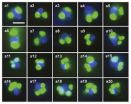(Press-News.org) WASHINGTON, Jan. 20, 2011 — The latest episode in the American Chemical Society's (ACS) award-winning podcast series, "Global Challenges/Chemistry Solutions," focuses on development of a new ultra-light biodegradable foam plastic material made from two unlikely ingredients: The protein in milk and ordinary clay.
The material could be used in numerous products, researchers report in the ACS' Biomacromolecules, a monthly journal. The finding comes amid ongoing concern about plastic waste accumulating in municipal landfills, and reliance on imported oil to make plastics.
David Schiraldi, Ph.D., of Case Western Reserve University, explains that 80 percent of the protein in cow milk is a substance called casein, which already is used in making adhesives and paper coatings. But casein is not very strong, and water can wash it away. To beef up casein, and boost its resistance to water, he and his team blended in a small amount of clay and a reactive molecule called glyceraldehyde, which links casein's protein molecules together.
"We believe this new 'green' foam plastic can have a wide range of uses," says Schiraldi. "For example, we can see it in furniture cushions, insulation, packaging and many other products. By replacing standard foam this could have an important impact on better protecting the environment from debris."
INFORMATION:
This podcast is available without charge at iTunes and from ACS' website at www.acs.org/globalchallenges.
Global Challenges/Chemistry Solutions is a series of podcasts describing some of the 21st Century's most daunting problems, and how cutting-edge research in chemistry matters in the quest for solutions. Global Challenges is the centerpiece in an alliance on sustainability between ACS and the Royal Society of Chemistry. Global Challenges is a sweeping panorama of global challenges includes dilemmas such as providing a hungry, thirsty world with ample supplies of safe food and clean water; developing alternatives to petroleum to fuel society; preserving the environment and assuring a sustainable future for our children; and improving human health.
The American Chemical Society is a nonprofit organization chartered by the U.S. Congress. With more than 163,000 members, ACS is the world's largest scientific society and a global leader in providing access to chemistry-related research through its multiple databases, peer-reviewed journals and scientific conferences. Its main offices are in Washington, D.C., and Columbus, Ohio.
Latest American Chemical Society podcast: Biodegradable foam from milk protein and clay
2011-01-21
ELSE PRESS RELEASES FROM THIS DATE:
Scripps Research scientists find measles' natural nemesis
2011-01-21
LA JOLLA, CA – January 20, 2011 – Scientists at The Scripps Research Institute have found that a known enzyme in cells protects against measles virus, likely by altering the virus's genetic material, RNA. Cells lacking the enzyme become highly vulnerable to the virus's destructive effects. The enzyme also protects against several other respiratory viruses, including influenza A.
"We believe that host cells use this RNA-editing enzyme to slow these viruses' ability to replicate," said Michael B. A. Oldstone, the study's senior author and a professor at Scripps Research's ...
War, plague no match for deforestation in driving CO2 buildup
2011-01-21
Stanford, CA— Genghis Khan and his Mongol hordes had an impact on the global carbon cycle as big as today's annual demand for gasoline. The Black Death, on the other hand, came and went too quickly for it to cause much of a blip in the global carbon budget. Dwarfing both of these events, however, has been the historical trend towards increasing deforestation, which over centuries has released vast amounts of carbon dioxide into the atmosphere, as crop and pasture lands expanded to feed growing human populations. Even Genghis Kahn couldn't stop it for long.
"It's a common ...
Insect eyes inspire improved solar cells
2011-01-21
WASHINGTON, Jan. 20 – The eyes of moths, which allow them to see well at night, are also covered with a water-repellent, antireflective coating that makes their eyes among the least reflective surfaces in nature and helps them hide from predators in the dark. Mimicking the moth eye's microstructure, a team of researchers in Japan has created a new film, suitable for mass-production, for covering solar cells that can cut down on the amount of reflected light and help capture more power from the sun.
In a paper appearing in Energy Express (www.OpticsInfoBase.org/ee), a ...
For robust robots, let them be babies first
2011-01-21
VIDEO:
A two-minute video, "Morphological Change in Machines Accelerates the Evolution of Robust Behavior, " was produced by the Morphology, Evolution and Cognition Laboratory, University of Vermont, 2011.
Click here for more information.
Want to build a really tough robot? Forget about Terminator. Instead, watch a tadpole turn into a frog.
Or at least that's not too far off from what University of Vermont roboticist Josh Bongard has discovered, as he reports ...
Gene test shows which bladder cancer patients may have cancer spread
2011-01-21
AURORA, Colo. (Jan. 20, 2011)--Cancer scientists have designed the first molecular test to predict which bladder cancer patients may have cancer involvement in their lymph nodes at the time of surgery—which could help doctors determine which patients are good candidates for pre-surgical, or neo-adjuvant, chemotherapy.
The test analyzes 20 genes on tumor biopsies, according to a paper published online Jan. 20, 2011, in Lancet Oncology.
"Randomized clinical trials have shown that giving neo-adjuvant chemotherapy extends patient lives, but only 5 to 15 percent of patients ...
UC Davis study shows plants moved downhill, not up, in warming world
2011-01-21
In a paper published today in the journal Science, a University of California, Davis, researcher and his co-authors challenge a widely held assumption that plants will move uphill in response to warmer temperatures.
Between 1930 and 2000, instead of colonizing higher elevations to maintain a constant temperature, many California plant species instead moved downhill an average of 260 feet, said Jonathan Greenberg, an assistant project scientist at the UC Davis Center for Spatial Technologies and Remote Sensing.
"While the climate warmed significantly in this period, ...
Simple, ingenious way to create lab-on-a-chip devices could become a model for teaching and research
2011-01-21
With little more than a conventional photocopier and transparency film, anyone can build a functional microfluidic chip.
A local Cambridge high school physics teacher invented the process; now, thanks to a new undergraduate teaching lab at Harvard's School of Engineering and Applied Sciences (SEAS), students will be able explore microfluidics and its applications.
The Microfluidics Lab, developed by Dr. Anas Chalah, Director of Instructional Technology at SEAS, takes advantage of a simple but ingenious new method of creating lab-on-a-chip devices that are quick to produce, ...
Speaking the same language means better health care quality, Wayne State University study finds
2011-01-21
DETROIT—Wayne State University researchers have found that when patients and providers speak the same language, patients report less confusion and better health care quality. The findings were based on data from the Pew Hispanic Center/Robert Wood Johnson Foundation's Latino Health Survey.
Understanding the relationship between language and health care quality has important public health implications for providing services in an increasingly diverse U.S. population, according to Hector M. González, Ph.D., assistant professor of family medicine and public health at WSU's ...
Strong social ties benefit breast cancer patients
2011-01-21
Breast cancer patients who have a strong social support system in the first year after diagnosis are less likely to die or have a recurrence of cancer, according to new research from Vanderbilt-Ingram Cancer Center (VICC) and the Shanghai Institute of Preventive Medicine. The study, led by first author Meira Epplein, Ph.D., assistant professor of Medicine at VICC, was published in a recent edition of the Journal of Clinical Oncology.
Patients in the study were enrolled in the Shanghai Breast Cancer Survivor Study, a large, population-based review of female breast cancer ...
Newly discovered group of algae live in both fresh water and ocean
2011-01-21
A team of biologists has discovered an entirely new group of algae living in a variety of marine and freshwater environments. This group of algae, which the researchers dubbed "rappemonads," have DNA that is distinctly different from that of other known algae. In fact, humans and mushrooms are more closely related to each other than rappemonads are to some other common algae (such as green algae). Based on their DNA analysis, the researchers believe that they have discovered not just a new species or genus, but a potentially large and novel group of microorganisms.
The ...



